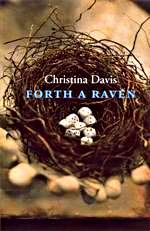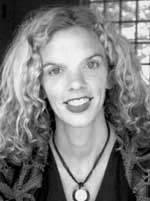
Jill M. Neziri
reviews
Forth a Raven
by Christina Davis
52 pp. Alice James. www.alicejamesbooks.org. US $14.95. 1882295579 paper
This review is about 4 printed pages long. It is copyright © Jill M. Neziri and Jacket magazine 2007.
1
Christina Davis’ first book of poems, Forth a Raven, confronts the tenuous nature of existence in a postmodern world where God, language and memory no longer exist as ontological certainties. A high order for a debut poet, Davis nonetheless rises to the occasion of her subject matter, shaping restrained, reticent poems that depict the uncertainty of contemporary existence through a tendency toward understatement and skillful use of white space. The speakers of Davis’s poems struggle for self-definition within an agnostic world where conclusiveness is more than evasive. Yet in spite of this searching, Davis’ speakers appear remarkably wise as she crafts her own aphorisms within the context of the poems. Ultimately, however, these maxims succumb to Davis’ questioning, leaving readers face to face with the dubious nature of existence and satisfyingly, without concrete answers.

2
Forth a Raven is divided into three sections, each of which focuses upon an area of uncertainty. In the first section, Davis deals with human isolation and the indeterminate nature of contemporary existence. The title piece of the collection begins this section by announcing this theme. In this poem, Davis is particularly concerned with modern existence in a world where “god” has been relegated to “the attic.” Davis underscores this agnosticism throughout the collection by refusing to capitalize the word “God” although she is clearly referring to a deity in the singular definite. ‘Forth A Raven’ grounds its exploration of existence in the image of the birds that Noah sends forth in Genesis to discern whether or not the floodwaters have receded. Interestingly, Davis does not name the “birds” that appear in this poem nor does she reference the raven that in the Old Testament fails to return to the ark. This reticence is characteristic of Davis’ style in which she rarely composes stanzas of more than four lines and insists upon a certain amount of withholding and disconnectedness between stanzas. ‘Forth A Raven’ utilizes the white space of the page by allowing the gaps between lines to create a visual portrait of the probing uncertainty that characterizes the speaker’s and implicitly humanity’s condition. The speaker voices this tentativeness with the italicized questions “Do you love me? Will I die?” that physically lie at the center of the poem. The birds, which simultaneously exist “like a question” and like an answer, carry the reply:
paragraph 3
We came in full view
of an island
or a continent, for we knew
not whether.
4
This reply embodies hope, announcing the end of the deluge and thus of tentative existence, but it also reinforces the uncertainty of the poem. The use of “whether” at the conclusion rather than the expected “which,” as in “for we knew not which,” creates an atmosphere of inconclusiveness. One leaves the poem wondering “whether what?” and noting that the speaker’s questions are only minimally answered when “the birds reply.”
5
Much of the second section of Forth a Raven consists of ruminations upon the inadequacies of language, especially in the quest for spirituality. In ‘Jubilat,’ Davis writes in response to the controversy that arose when “In 1885, the American Old Testament Revision Company put forth a new edition of the Bible” with a “glossary that included a brief...list of ways ‘in which it differs from the British company.’” ‘Jubilat’ engages in wordplay in order to illustrate the failures of language. The poem begins by pointing out shades of differences in word choices. The speaker instructs, “For ‘agone’ read ‘ago’” and “Let the ‘food’ be ‘meat’.” Soon though, language grows even more slippery, and words are replaced with their antonyms, such as when the speaker announces, “Let ‘let’ mean ‘not let’,” the reasoning being that these words have “so completely.../laid down with their shadows.” In the end, language becomes ineffectual and the focus shifts to communication beyond language. Davis concludes the poem with an image of “angels/ and lovers whose comings alone/ are comprehended/ not their tongues.” Here, uncertainty and confusion are dissolved through physicality and the proximity of bodies.
6
The penultimate poem of the collection, ‘Last Words,’ employs a first person narration that is more detailed than many of the other poems and yet still maintains Davis’ characteristic reticence. The poem depicts the death of the speaker’s grandmother, focusing upon the final breaths that seem only to be “breathed in and in.” Death becomes a sort of self-expansion of the dying woman in which she is rendered in her final moments a reflection of “who she might have been if No had never been said to her” and there had never been any “hindrance” in her life. Death is not something to be bemoaned in Davis’ vision but rather something to be desired, as in ‘Revival’ where the speaker chants “I wanna die” not because she is suicidal but because she seeks understanding and knows that “it must include the root.” The liberation from uncertainty through death is reflected in the final line of ‘Last Words’ when the speaker comments over the dying grandmother, “this was what Yes looked like.”
7
In addition to thematic links between uncertainty, language and death, Forth a Raven is also characterized by the pithy maxims that form a large portion of the poems. These are poignant both in and out of context and include such as:
8
“In the history of language/ the first obscenity was silence.”
“what we never see/ the back of/ is the self.”
“But of little, at least, there will never be shortage.”
9
These self-created proverbs help to portray speakers who in spite of all their questioning are nevertheless quite incisive.
10
In the endnote to Davis’ ‘The Raven’s Book,’ we learn that to be “in the raven’s book” is an antiquated way of saying “I am dying.” With this mind, Davis’ collection becomes a reflection upon not only present existence but also mortality and the potential for an afterlife. Certainly, little is resolved in Forth A Raven. The speaker does not gain an understanding of existence down to the very “root.” However, moments of confusion are punctuated by glimpses of clarity and poignancy through which Davis renders this necessary and authentic depiction of our largely tentative existence.

Christina Davis
Christina Davis (left) received her B.A. and M.A. from the University of Pennsylvania and her M.Phil. in Modernist Literature from the University of Oxford. The recipient of several residencies to Yaddo and MacDowell, as well as to the Valparaiso Foundation in Spain, she is currently Associate Director of the NYU Creative Writing Program.

Jill Neziri
Jill Neziri is a poet and a graduate student at Fordham University. She is co-editor of the anthology From the Heart of Brooklyn (Vivisphere 2006).
The Internet address of this page is http://jacketmagazine.com/33/neziri-davis.shtml